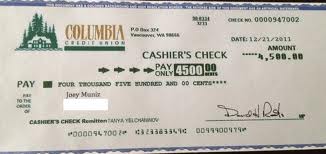 You just sold your car to what appeared to be a regular guy. After some back and forth negotiations the buyer agreed to accept what you considered a fair price. You sign over the title to the buyer, give him the keys, and the buyer gives you an official cashier’s check for the purchase price which is usually considered as good as cash.
You just sold your car to what appeared to be a regular guy. After some back and forth negotiations the buyer agreed to accept what you considered a fair price. You sign over the title to the buyer, give him the keys, and the buyer gives you an official cashier’s check for the purchase price which is usually considered as good as cash.
After waving goodby to the nice guy who just bought your car you drive to your bank and deposit the cashier’s check into your bank account. A week or so later you almost have a heart attack when your bank calls you up to inform you that payment was denied on the cashier’s check since it was counterfeit.
Meanwhile, your car is on a boat to the Ukraine for resale or has already been chopped into parts for sale by a not so ethical used parts car store. The police politely take a stolen car report from you but the car is never recovered and even worse the bank is not liable in any way to reimburse you for the counterfeit cashier’s check. You have just given away your car to a criminal for free who used a form of fraud that is becoming increasingly common.
The Office of the Comptroller of the Currency has issued 18 alerts this year regarding counterfeit cashier checks issued under the name of various banks. Printing devices and computer technology has advanced to such a degree that it is impossible even for most experts to identify a counterfeit cashier’s check. A consumer ripped off by a con man paying for an item with a counterfeit cashier’s check usually has no ability to discern a real cashier’s check from a counterfeit and even worse, there is usually little recourse for recovering your money.
Consumers who have been the victims of a counterfeit cashier’s check are advised by the Office of the Comptroller of the Currency to file complaints with the following agencies.
- Federal Trade Commission (FTC): by telephone at (877) FTC-HELP or, for filing a complaint electronically, via the FTC’s Web site at www.ftc.gov.
- Better Business Bureau (BBB): The BBB system serves markets throughout Canada, Puerto Rico, and the United States and is the marketplace leader in advancing trust between businesses and consumers. The Web site www.bbb.org offers contact information for local BBBs, objective reports on more than 2 million businesses, consumer scam alerts, and tips on a wide variety of topics that help consumers find trustworthy businesses and make wise purchasing decisions.
- Federal Bureau of Investigation Internet Crime Complaint Center (to report scams that may have originated via the Internet). Its Web site is www.ic3.gov.
- If correspondence is received via the U.S. Postal Service, contact the U.S. Postal Inspection Service by telephone at (888) 877-7644; by mail at U.S. Postal Inspection Service, Office of Inspector General, Operations Support Group, 222 S. Riverside Plaza, Suite 1250, Chicago, IL 60606-6100; or via the online complaint form at https://postalinspectors.uspis.gov/forms/MailFraudComplaint.aspx.
Consumers burned by counterfeit checks are also urged to bring the matter to the attention of the Office of the Comptroller of the Currency (OCC) as detailed below.
| E-mail: | occalertresponses@occ.treas.gov | |
| Mail: | Office of the Comptroller of the Currency Special Supervision Division 400 7th St. SW, Suite 3E-218; MS 8E-12 Washington, DC 20219 |
|
| Phone: | (202) 649-6450 | |
| Fax: | (571) 293-4925 | |
| Internet: | www.occ.gov |
What can a consumer do to protect himself from accepting a counterfeit cashier’s check when selling an item? Cash is always a good option but if the buyer insists on using a cashier’s check request that he allow you to accompany him to the bank and observe the cashier’s check being prepared by an official bank representative. If this is not possible, do not accept a cashier’s check from a non local bank or call the bank directly and ask them if they issued the cashier’s check.
Criminals are working 24/7 to try and put your hard earned money into their pockets. Be alert and don’t hesitate to walk away from a buyer paying with a cashier’s check if he won’t cooperate with you to verify the authenticity of the check.

Speak Your Mind
You must be logged in to post a comment.